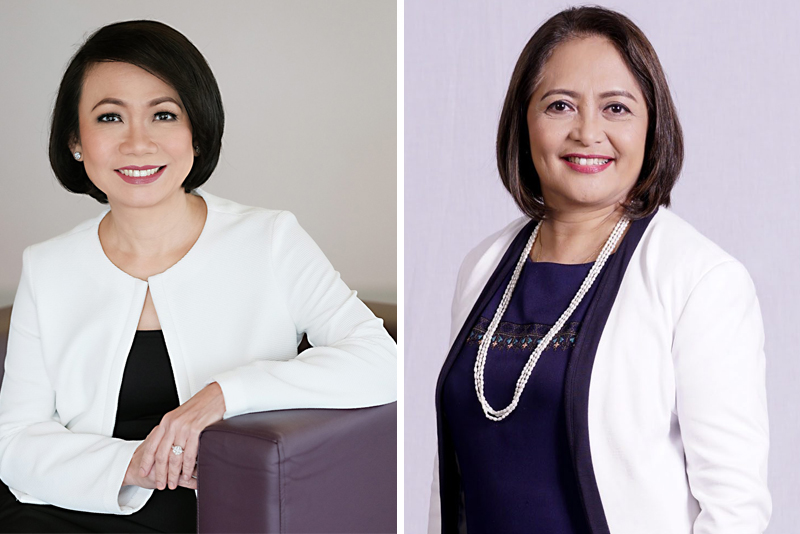Women leaders driving Philippine economic growth

After 25 years in Sun Life Philippines, president and CEO Riza Mantaring(left) remains passionate about financial literacy and protection. “Knowing that we provide a valuable service that makes a difference to someone’s life still excites me.” From bank examiner to deputy governor of the BSP, Chuchi Fonacier(right) has no regrets in her career as a public servant. Her advice to young women: “Never view your gender as an obstacle in attaining your goals.”
MANILA, Philippines — On March 8, the world will once again celebrate International Women’s Day (IWD) and toast the achievements of women across social, economic, cultural and political arenas.
Unlike the #MeToo campaign which grabbed headlines last year as women came together to break their silence about sexual harassment, IWD is not a new movement. Its roots date back to 1908 when some 15,000 women marched through New York City demanding shorter hours, better pay and voting rights. A year later, the first National Woman’s Day was observed across the United States. Two years after in 1911, the world followed suit thanks to Clara Zetkin who proposed the idea of IWD in the International Conference of Working Women held in Copenhagen.
Here at home, with the leadership of the Philippine Commission on Women, IWD will be observed month-long with activities designed to engage many stakeholders and showcase inspiring women. The 2018 celebration is anchored around the theme “We Make Change Work for Women” and will highlight the empowerment of women as active contributors to and claimholders of development.
And when it comes to development, one area where women’s contributions can be easily measured is in finance. With the Philippine economy growing more than six percent for a 10th consecutive quarter by end 2017, the country is clearly one of the economic stars of Asia, if not the world.
In this two-part series, get to know the women who are driving the country’s growth as private citizens and public servants. In their work, they are shaping the present and the future of the Philippine economy.
BSP Deputy Governor Chuchi Fonacier
While the financial sector welcomed the selection of Nestor Espenilla Jr. in 2017 as Bangko Sentral ng Pilipinas (BSP) Governor, ensuring continuity and stability, there were two appointments that same year that drew applause from diversity advocates watching this regulatory agency.
In January and June, two women were given three of the deputy governor positions in BSP. Not only did women ended up as the majority, they also addressed a gap of over 30 years during which only men held the roles.
Espenilla named veteran central banker Chuchi Fonacier to fill his vacated post as head of Supervision and Examination Sector. In her new role, this Bacolod native takes on the challenge of regulation of banks and other BSP-supervised financial institutions (BSFI), against the backdrop of rising incidence of financial fraud.
Fonacier is also responsible for the BSP’s inclusive financial advocacy programs, along with technical services, administrative and operations, plus four sub-sectors that manage onsite examination and inspection, offsite supervision, financial literacy, consumer affairs, financial data collection, and policy studies. Quite a full plate for someone who started as a bank examiner in 1984.
What made you join the BSP as opposed to pursuing a career in the private sector say one of the leading banks or accounting firms?
I wanted to serve in the government, particularly in a government institution that is highly regarded such as the BSP. The BSP is where, I believe, I could serve and contribute best.
And you stayed for over 33 years through some of the toughest economic crises. Looking back, what were some of the most challenging milestones in your work?
One would be my involvement with initiatives related to financial inclusion and consumer protection which are both interesting and challenging areas for me, but from which I experienced a different sense of fulfilment because of the direct impact of these initiatives to the populace.
Another is my term as the director of the department in the BSP that handled specially-challenged banks where a record number of thrift and rural banks were resolved. This contributed in preserving the stability of the banking system, and protected the BSP from legal and reputational risks.
And of course my recent appointment as deputy governor of the Supervision and Examination Sector. It is a huge and challenging task, more so during these times when the financial landscape has become very dynamic, and the threats in the cyber-space are increasing, and more damaging and sophisticated.
It would seem just when one type of fraud is managed, another one comes up that is tougher to address. Cyber threats and denial of service attacks are popping up everywhere. With sophisticated fraud a key risk to the Philippine banking system, how are you staying one step ahead?
While we are now addressing existing cyber risks, key challenges remain. The fast-paced innovation and expansion of the electronic banking systems and services as well as entry of FinTech players may lead to the emergence of new types of risks.
Likewise, cyber threat actors are quickly innovating, well-funded and closely coordinated to launch more damaging attacks and threats. As such, the BSP must ensure the following to stay ahead of the adversaries: (1) Fostering a regulatory landscape that is resilient to existing as well as emerging cyber-threats and responsive technological innovations; (2) Strengthening the skills, proficiency and capability of bank supervisors to understand highly-technical and advanced e-commerce and cybersecurity matters as well as emerging innovations to come up with consistent and sound assessments of BSFIs’ information security risks and posture; and (3) Engaging stakeholders, locally and abroad, i.e. BSFIs, law enforcement agencies, service providers and other concerned parties, to collaborate and share information to further enhance the cyber-resilience of the financial system.
In your role, you also drive the inclusive finance advocacy unit of BSP. What is the biggest challenge for you here? And what is the one thing you hope to achieve during your term?
Financial inclusion is the baby of Governor Espenilla. I play a supporting role in this initiative. The BSP has embraced financial inclusion as a strategic objective alongside its primary mandates. Since 2000, we have issued several key regulations supportive of financial inclusion. These regulations seek to minimize if not eliminate the hurdles faced by banks in providing responsive and responsible financial products and services to unbanked and underserved sectors. This approach has been noted and recognized regionally and globally as a regulatory approach conducive for financial inclusion.
The biggest challenge however is in the adoption and in seeing the actual increased level of access to and usage of financial products and services. This is what will give true meaning to the recognitions received by the BSP and the country on financial inclusion.
You also have oversight for financial literacy and consumer affairs. On financial literacy, how would you rank Filipinos versus our Asian neighbours? What do you hope to change? On consumer affairs, do you feel the banks are now more responsible in engaging consumers with offers? What change would you like to see?
Financial literacy in the Philippines is an area we need to dedicate our effort and resources. In an Asia Pacific survey, the Philippines was ranked 11th among 17 countries in a financial literacy index which measures skills in basic money management, financial planning and investment. Also, in a country specific study done by World Bank in 2015, it was shown that on the average, Filipino adults were able to answer correctly 3.2 out of 7 financial literacy-related questions which covers basic calculus and financial concepts such as simple interest rates, inflation, compound interest, risk diversification, and the main purpose of insurance products.
It is this reality that pushed the BSP to promote financial literacy. We believe that financial literacy can help empower citizens to become better economic agents. We also believe that achieving financial inclusion not only necessitates providing access to financial products but also equipping users with the knowledge to empower them as financial consumers.
We are also moving to expand our reach through effective partnerships and using social media to reach more Filipinos, particularly the millennials.
As one of the two women given deputy governor roles after more than three decades, how did it make you feel?
I feel greatly honored to be entrusted with the position but I also know that I have big shoes to fill, both figuratively and literally. The accomplishments and achievements of then Deputy Governor and now our Governor Nestor A. Espenilla Jr. are unparalleled and difficult to replicate. I believe, however, that with the very capable and dedicated team at my sector supporting me, we will be able to achieve our mandate of promoting the soundness and safety of the financial system that is supportive of a broad-based and inclusive economy.
On the lighter side, when I say big shoes to fill literally, I think that as a woman, using my high heels, I can now have a good view of the banking system on a bigger perspective and relate it as well to individual banks composing the entire system.
Most finance students who are women are likely looking at joining traditional financial institutions when they look for jobs – what would your advice be to them? And advice to young women in general?
Follow your dreams, pursue your interests, work hard and love your work. Never view your gender as an obstacle in attaining your goals in life. After all, success is a result of one’s hard work and determination, regardless of gender.
I believe that the banking industry offers a lot of career opportunities for women. We witness an increasing women’s participation in the board and top management of banks which means that valuable contribution of women in the industry is now being recognized more.
Sun Life CEO Riza Mantaring
As the country’s oldest insurance company, Sun Life Philippines has survived two world wars and countless economic crises. But it was the leadership of Riza Mantaring that transformed it into the industry leader, with P32 billion in premiums recorded in 2016 and over three million clients as of end 2017.
Soon after she took on the role of president and chief executive officer in 2009, Riza embraced increasing the Filipinos’ financial literacy as an advocacy, understanding that its uptrend will also drive the company’s success.
Her groundbreaking efforts that include multi-media campaigns paid off. Not only did the consumers’ better understanding of financial products boosted their revenues, Sun Life’s trust rating also improved. When polled by YouGov for its Brand Advocacy Rankings over a 12-month period from November 2016, Filipinos ranked the brands they love and the only financial company to make it in the top 10 was Sun Life.
Her next ambitious goal? Turn the milestone three million into five million clients by 2020.
Philippines has one of the lowest insurance penetration rates in the world, and we are still currently trending below the three percent ASEAN average. How are you driving growth in this environment?
Where it started for me in 2009 was when we realized financial literacy is really poor in the country. Before we could even begin to grow life insurance in this market, we had to educate the Filipinos. So, we launched the very first multi-media financial literacy advocacy and we leveraged on celebrity endorsers and billboards to drive home the message.
If you looked at our campaign which we called It’s Time, the Sun Life brand came only at the end and we did not use our company colors of yellow and blue. The intent was really to educate, and what we found was while we were not trying to build the brand, that’s what actually happened. I guess when the public realized here’s a company that’s trying to educate me, not just sell to me, I think that made the difference.
The trust level in Sun Life grew and that has been the backbone of our steady growth since.
I’m proud to say that despite our single digit penetration number in the country, we are the most successful franchise of Sun Life in Asia, as the biggest contributor in net income for this region.
Consumers tend to shy away from insurance agents. Despite the brand recall of Sun Life, it can’t be easy to do a cold sales call. How would you convince someone to buy insurance and become a Sun Life client?
When you buy a car, you insure it. When you buy a house, you also insure it. So why won’t you insure your most valuable asset which is yourself?
Simply put, insurance helps you prepare for life’s uncertainties.
Today we still continue our financial literacy advocacy because we need to keep driving home that message. We make sure to cut across from our advertising campaigns to our Corporate Social Responsibility activities. We hold free financial planning sessions. We have people that talk in schools to educate the students on the need for financial planning.
And we are gratified to see surveys that indicate 70 percent of Filipinos now can tell you the basic characteristics of each type of financial product. With awareness comes interest and we have made insurance and Sun Life relatable to the public. It comes as no surprise that we now see people walking in to our sales centers wanting to buy our products or calling to ask for how they can get one.
After 25 years in the life insurance industry and in Sun Life, what still excites you? What continues to frustrate you?
Knowing that we provide a valuable service that makes a difference to someone’s life still excites me. We’re in a position to help protect a family that might suddenly lose their source of income if something happens to the breadwinner. Every day, we hear client stories and they remind us that the work we do matters.
How do you view FinTech companies – as allies in closing this gap or as competitors that will eat your market share?
We are in fact investing in FinTech and we recognize that innovation often comes from places you least expect.
Our industry is heavily regulated so things do not move as quickly as you would like sometimes, but with good reason because we are dealing with people’s money and consumer protection is always top of mind.
But then a startup may come on the scene with something completely different because they do not operate under the same sort of restrictions. We’ve seen this happen in other countries where companies come out of nowhere and become the biggest player in a matter of one or two years.
Financial services companies run the risk of becoming obsolete unless they are ready to embrace the right technology and partners.
As a young girl, did you dream of being CEO someday? What gave you the confidence to pursue your career?
I wanted to be an astronaut, then a doctor, then an architect. I was entering college and I still did not know for sure what I wanted. But one thing was clear to me and it came to me one afternoon while I was in my room and sitting at my desk: I didn’t want to get to the end of my life, look back and realize that it meant nothing.
I was fortunate because of the way I was raised by my parents. I have 3 sisters and a brother, and there were no barriers placed before us. I have a sister who is a neonatologist and runs the neonatal intensive care unit in a large hospital in the US. My other sister has a doctorate in artificial intelligence and my third sister holds US patents in software engineering. My brother is not lagging, he holds over a dozen patents for hardware design also in the US.
Both my parents topped the Board exams in Chemical Engineering when they took them. I believe children learn best by example and our parents gave us that.
What advice can you share to young women in pursuing careers? Do you feel they have better chances of success with all the diversity movements today?
Hard work always beats talent. I’ve seen so many extremely intelligent people end up nowhere because they did not want to put in the work. You should also embrace continuous learning. Always open yourself to new things because the pace of change will accelerate more in the coming years. I read that 95 percent of the jobs in 2030 do not exist today. You can only prepare for that by being willing to change and to adapt.
I started in IT and I consider it a gender neutral field. It was all about competence and I never felt discriminated against because I was female. I didn’t expect to be treated differently because I am female, so my male colleagues took that cue.
Here in Sun Life, half of our leadership team are female. If you look at the next level below, half are also female. I think women will naturally rise in gender neutral environments.
(Catch the second part next week for inspiring stories of more women leaders in the public and private sectors.)
- Latest

























